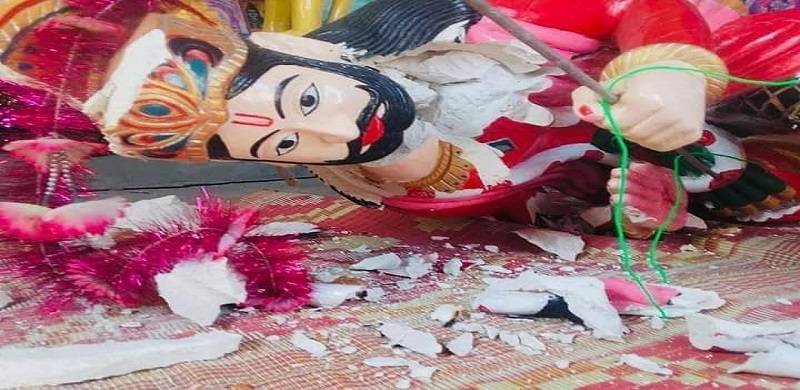
A vicious attempt to vandalize Baba Ramapir temple was made in Badin earlier this year by a man who was later declared mentally ill by the authorities. The sanctity and deity of the temple was destroyed, thus deepening the despair Pakistani Hindu community finds itself in.
The third-largest sacred site for the Hindu community in Pakistan, Baba Ramapir temple, is located in Sindh. The pilgrimage that takes place brings thousands of worshippers to pay their respects to the deity, who is seen as a savior.
The temple of Ramdev alias Ramapir is built in the memory of the 19th century Hindu saint by the same name. It’s painted in vibrant colors, and women are often seen wearing traditional Sindhi attire (saris, common among the Hindu community) and bangles characterizing their unique identity.
“Muhammad Ismail entered the temple and attacked the diety,” says 28-year-old Mukesh. He lives among the many Hindu residents of the Kario Ghawar, Badin. Narrating the incident, he said that Ismail barged in and began to destroy Shri Ramapir temple unprovoked.
Witnessing the vandalism with horror
“I was standing right there watching in disbelief while this man slashed revered deities placed in the temple,” Ismail laments while revealing details of the attack on the temple in Badin.
Another eyewitness mentioned that it was the hour of worship, so the community members were present at the temple. They saw Ismail breaking into the temple and were taken aback. He not only destroyed the temple property and desecrated idols but also threatened the Hindu worshippers to leave.
Ashok Kumar, who works as a caretaker of the temple, went to Badin’s nearest police station and lodged an FIR against him. He was told that Ismail had been charged with blasphemy under section 295-A of the Pakistan Penal Code.
After a few hours of the incident, the police officer SHO Asghar Sathio showed up at the location and arrested Muhammad Ismail, who allegedly destroyed the idols. SHO Asghar said, “It is yet to be investigated in detail if Ismail is mentally unstable or if it was an intentional malafide act on his part.” However, he was ordered to produce an inquiry report of the case within 24 hours of the event’s occurrence.
Hindu community specifically targeted
“This is not the first time a worship place significant for a religious minority in Pakistan has been attacked,” said Ashok Kumar, who seemed deeply disturbed about the incident.
“We feel the Hindu community is targeted across the country time and again, be it the destruction of Hanuman temple in Karachi or demolition of Hindu community houses in Bahawalpur cases keep emerging every week,” Ashok adds.
For the past many years, Hindus here have been facing the brunt of extremism, mob attacks, and violence. There are countless cases of forced conversions, sexual assault, and rape of young Hindu girls. The wave of intolerance and assault on the community due to their religious identity shrinks the spave for them.”
“When will this religious discrimination stop,” asks a 26-year-old activist Chamman Lal. He said that the Hindu community appears to be more outraged than frightened due to the undocumented persecution. “We too are the sons of this motherland,” he says. Chamman appealed to the state to take necessary measures to end this prejudice and intolerance so that Hindus can live peacefully in Pakistan.
Last year, Sacho Satram Dhan Temple in Ghotki, Sindh, was vandalized by an angry Mulsim mob. A complaint was registered against the 50 individuals charged with blasphemy, but no progress has been made on the case to date.
“Is the blasphemy law applicable only on non-Muslims?” asks Arun, a 25-year-old Hindu activist. “Law should treat every citizen equally,” he added. The founder of Pakistan, Quaid-e-Azam Muhammad Ali Jinnah, in his historic address, said, “You are free; you are free to go to your temples. You are free to go to your mosques or any other worship places in this State of Pakistan. You may belong to any religion, caste or creed—that has nothing to do with the business of the state”. Then why aren’t we able to exercise this freedom he guaranteed, he asks.
This feature has been published in collaboration with Ravadar , a blog series documenting the lives of religious minorities.
